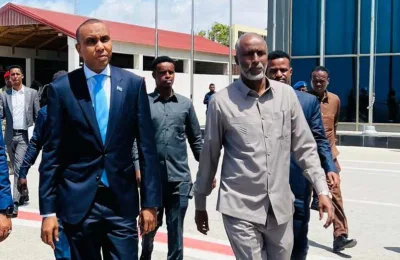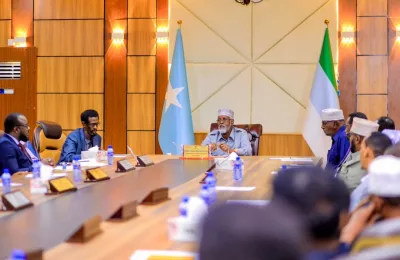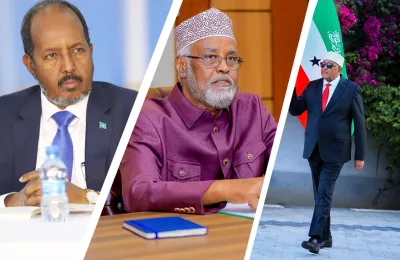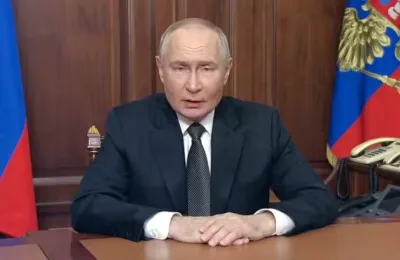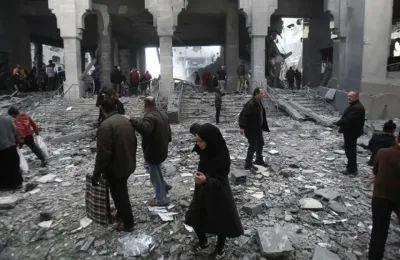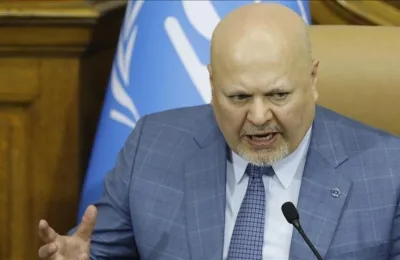Turkey President Recep Tayyib Erdogan on Sunday visited Mogadishu, the capital of the war-ravaged nation of…

Turkey President Recep Tayyib Erdogan on Sunday visited Mogadishu, the capital of the war-ravaged nation of Somalia. It was his second visit to the country in less than four years but his first time as a President.
During his one day visit, Mr Erdogan attended ceremonies to officially inaugurate a series of facilities built by Turkish governmental and nongovernmental organizations. Minutes after landing, President Erdogan officially opened the newly-built terminal of Mogadishu airport which he hopes will ‘’much benefit the Somali people.’’
Turkey’s rapprochement with Somalia formally began with the Istanbul Conference on Somalia during May 21-23, 2010 as part of Djibouti Agreement and long political transition process started in 2004.
The real turning point of Turkish commitment towards Somalia was the Erdogan’s visit during the holy month of Ramadan in the summer of 2011. The visit coincided with the opening of an humanitarian aid privileged channel towards Somali people hard hit by civil war and long famine crisis. Erdoğan was the first non-African leader to visit Somalia in nearly two decades.
However, in less than four years, Turkey has proved that pure human capital can be a better policy instrument than lending programs, aid donations, business deals, and diplomatic summits.
New ultra-modern hospital
Turkey has perhaps made the greatest contribution to the situation in Somalia in health and medical services. In a country where surgeries were virtually impossible and lives were lost in even the smallest of operations, now there is a brand new palatial-like hospital built by Turkey’s Health Ministry.
The new hospital which has been named after ‘’Recep Tayyib Erdogan’’ will be consisting of several branches such as; children, maternity, urology, neurosurgery, plastic surgery, internal medicine, general surgery, anesthesia, eye and dental branches. It is believed that the hospital is the largest and well-equipped in Central Africa.

Sources from the Turkish Health Ministry said that the hospital will be operating a budget of around $135.7 million. But Turkey will only contribute $85.6 million in the first five years only.
On top of that, Turkish doctors will provide training to the Somali doctors and will be in control of the administration and other departments of the hospital.
Meanwhile, Turkish airlines which flies to Mogadishu four times per week will start to fly now daily, President Erdogan revealed in his Press Conference. It became the first international airlines to resume flights to the country in more than 20 years.
Winning the hearts of Somalis
Still, many Somalis have benefited from Turkey’s new foreign policy efforts. As other countries’ humanitarian missions to Somalia stayed on the sidelines in Nairobi, Turkey showed aid could be administered effectively from Mogadishu.

Since the collapse of Siad Barre regime in 1991 Somalia has been dragged into civil war and become the most famous ‘failed state’ in the world. Turkey’s engagement with Somalia began in 2011 during a moment of a deep stalemate for the African country, the general power vacuum led Somalia to anarchy with power clashes between the center and periphery over resources and means of control. The result was two decades of clans conflicts, warlords, slaughter along sectarian and ethnic lines, famine crises, piracy, extreme poverty and religious fundamentalism.
The Somali civil war erupted at a time of profound change in the international order and Somalia was to become a laboratory for a new form of international engagement through humanitarian and military intervention on an unprecedented scale.
Erdoğan’s visit had a highly political significance because it enlightened Somali situation into the international agenda and paved the way intergovernmental organizations rapprochement. A few months after Erdogan’s trip there was an official visit of UN’s Secretary Ban Ki Moon. Erdoğan’s visit also had an important symbolic meaning because it showed to Turkish people that it wasn’t dangerous to go to Somalia, and to Somali one that they weren’t alone. The feeling of being completely isolated from the international community was widespread among Somali people. For that reason the reopening of Turkish Embassy in Mogadishu (November 2011) was very important and the Turkish Airlines’s opening of the flight Istanbul-Khartum-Mogadishu (March 2012). The presence of diplomatic office and infrastructure connections symbolized the reopening of the country to the world and a great step in the normalization process.
At the political and intra-state level, Turkey supports national reconciliation and the preservation of territorial integrity of all Somalia. For that reason Turkey has promoted the strengthening of Somali Federal Government’s (SFG) institutions, concurrently seeking the involvement of others political entities through dialogue and bilateral meetings. Turkey emerged as an active actor and brought the issue to the UN General Assembly meeting and called on the international community to undertake a continued approach to find a long-lasting solution.
‘Somalia is not only Mogadishu’
On the other hand, some of the Somalis criticize Turkey on only focusing on Mogadishu rather than investing other regions which some are stable than the capital.
‘’ Turkey should not only invest Mogadishu, we [Puntland] are a stable region and have an administration…. So the projects should be distributed equally. Mogadishu is still the capital of our country but Turks should remember that projects should be equal and the country is not only Mogadishu,’’ says a local elder who hails from the semi-autonomous region of Puntland.
An emerging economic giant
Many regard Turkey as an emerging market favorite for global investors, triumphing over many of its peers with strong growth. One of it’s ambitions is by the year 2023 to be among the top ten global economies.
Turkey’s economy was the fastest growing in Europe in 2011, growing 8.5 percent (the second fastest after China among major emerging market economies). But in 2012 Turkey, like China, experienced a slump in growth as the global economic slowdown adversely affected its exports and capital inflows.
In the era of globalization emerging powers have revived their ties with African countries. Their activism mainly in the economic field has affected African relations with traditional partners.
Turkey rising role in Africa had profound psychological effects on Turkish people. Initially it was necessary a change in the Turkish geographical perception towards Africa no longer considered as a poor and backward place but as a ground full of economic, human and cultural opportunities. The growing interest of the Turkish people for the African continent was manifested by media coverage and in the academic world with the proliferation of university courses, research centers,scientific journals, think tank branch and international conference focused on Africa.
When rebels toppled Muammar Gaddafi, the continent lost one of the biggest donors of aid to poor African countries and the largest single contributor to the African Union’s budget. With a growing charity outlay—Turkey’s foreign aid topped $1 billion in 2011—the Turkish central leadership is well positioned to fill, at least partly, the vacuum left with Gaddafi’s demise. Turkey’s trade volume with sub-Saharan African countries reached $7.5 billion in 2011, a 72 percent increase from the year before and a tenfold increase since 2000.
However, Turkey’s Africa outreach program gained momentum: It opened seven new embassies on the continent, including one in Mogadishu, established three months after Erdogan’s visit. Its new embassies in Zambia, Mozambique, Mauritania, Zimbabwe, Somalia, Gambia, and Niger preceded a $300 million rise in Turkish exports to those markets last year.
Another distinctive feature of Turkey engagement in Africa is the active role of the Turkish pro-Islamic civil society. The inclusion of civil society organizations has allowed the access to local channels and agents that the State can’t or don’t want to reach. The NGOs’s autonomy and their ability to build a mutual trust on the field leads to the inclusive approach of all conflict parties during talks and negotiations. The various activities of Turkish civil society’s organizations are shaping engagement and dialogue with all local factions, which is a central aspect Turkey’s conflict sensitive method. Besides actions of civil organizations are more flexible and dynamic than state’s agencies ones, a skill that makes them to adapt easier to multifaceted crisis as the Somali case. Turkey’s official diplomacy during mediation process uses links and credibility gained by its own non-state actors which help to pursuing the commitments made at the negotiating table. In Turkish mediation paradigm non-state actors help foster the inclusiveness of all parties and increase the mutual trust.
Turkey’s pro-active policy toward sub-Saharan Africa also provides a lab to probe the ‘total performance principle’ practical application. The increasing activities in Somalia as well as the loss of relevance in the Middle East have forced Turkey to fix its strategy in order to revitalize its soft power-oriented approach. The Somali case shows how total performance has fostered a new kind of interaction between state and non-state actors under the label of humanitarian diplomacy or humanitarian oriented approach.
Africa is a key area for all actors who aspire to become global power and to raise international relevance. Mediation efforts have given international visibility to Turkey and have improved its image in the whole continent. Turkey promotes stability in Somalia in order to create peace and development’ conditions for the whole region and to limit the Ethiopia rising as a leading power. Turkey’s partial success in Somalia has increased the Somali hopes and has demonstrated how Turkey try to become regionally and globally influential via soft-power. However lots doubts and dilemmas still remain. If total performance principle has served to breach the Somali lack of confidence, the coordination among State organisms (TIKA, ministers), Turkish NGOs and the Somali governments remains a great limit of Turkey’s activities. That issue is further problematized by the fragmented condition of Somali official institutions and its endemic corruption.
Turkey’s new foreign policy strategy to the East African region sets a positive example for other global economic leaders. It has used foreign assistance as a successful way to ensure strong trade relationships, return investments and hope for future repayment.
Turkey is now proving that pure human capital can be a better policy instrument than lending programs, aid donations, business deals, and diplomatic summits. Not all of Turkey’s tactics can be adopted by other foreign powers, of course—few other countries have international education networks as vast or as intimate with local elites.
Ayub Abdirahman
Horseed Media
Follow the writter on twitter: https://twitter.com/AbdirahmanAyub


